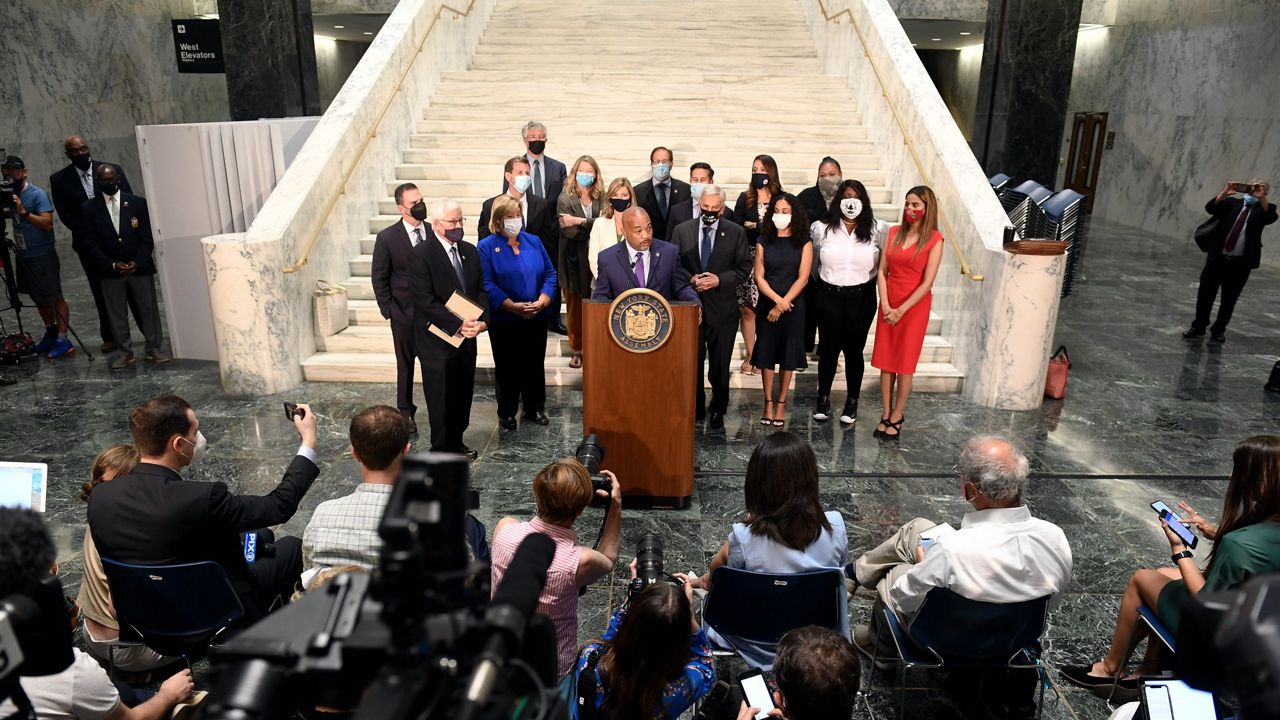Assemblyman Charles Lavine, the top Democrat leading the impeachment investigation of Gov. Andrew Cuomo, insisted on Monday he wants to get the procedure right.
He repeatedly pointed to a rather unwieldly word -- "malversation" -- to explain the approach lawmakers on the Assembly Judiciary Committee are taking.
Malversation is corrupt behavior by someone in a position of trust or public office. That's the term lawmakers could eventually apply to Cuomo, as they move forward with the first impeachment of a sitting governor in more than a century.
A report released last week by Attorney General Letitia James determined the allegations of 11 women who have accused Cuomo are credible, that his office sought to actively undermine some of these claims and that state and federal laws were broken. The Albany County Sheriff's Office has opened a criminal probe into the allegation Cuomo inappropriately touched one woman, Brittany Commisso.
But is this impeachable? Cuomo's attorneys have, naturally, argued that it is not. Cuomo has denied any wrongdoing, and his legal team claims the investigation of independent attorneys, including a former federal prosecutor, was conducted unfairly.
Perhaps it's the governor's reputation for rarely backing down or the three-person legal team the governor has assembled to respond to the crisis engulfing his administration, but Assembly Democrats leading the impeachment effort have signaled repeatedly in recent days they want to get the process right.
Lavine on Monday outlined a plan for the next several weeks on Monday, including public hearings as well as private meetings for the Assembly Judiciary Committee, which he chairs. Lawmakers plan to take testimony from experts on impeachment as well as sexual harassment policy.
They will review reams of documentation and evidence gathered by investigators, and some of that material has already been sent to the Assembly as of Saturday evening.
Cuomo has until Friday at 5 p.m. to provide documents in his defense.
“We will not take any official action at least until after that Friday at 5 o’clock deadline," Assemblyman David Weprin told NY1 on Monday morning. "So we’d like to see what he’s going to submit and consider that. But clearly the allegations are very troublesome, very serious.”
Lawmakers began the impeachment probe in March amid the firestorm of allegations. It quickly drew in a range of controversies facing Cuomo, including the tabulations of nursing home deaths during the COVID-19 pandemic and where those deaths occurred, the circumstances surrounding the writing of his book about the pandemic and the construction of the replacement for the Tappan Zee Bridge.
At the time, Democrats and Republicans alike were calling for Cuomo's resignation, but polls had shown only middling enthusiasm for doing so. The investigation was seen as something of a relief valve on the increasing pressure for the governor to step down or at least until the findings of the separate attorney general probe was complete.
But the report released last week on the sexual harassment allegations appeared to be a tipping point for lawmakers and potentially the public in New York.
The Sexual Harassment Working Group, an organization of former government staffers, called for an immediate impeachment of Cuomo in the Assembly, pointing to the 30 days that must pass between the resolution's approval and the trial taking place in the state Senate.
"There is no excuse for the delay; the time to draft the articles of impeachment and bring them to a vote on the Assembly floor is now," the group said in a statement.
Nevertheless, the Assembly's efforts, in part, are to prevent a Cuomo challenge in the future.
In the state Senate, Democrats there are also reviewing the rules and procedures for an impeachment trial. And top lawmakers there expect a legal challenge to removing Cuomo would stand little chance.
"I don't expect their will be any grounds to challenge anything," said Sen. Mike Gianaris. "Secondly, there's not a lot of room to challenge impeachments. It's vital to the separation of powers."


